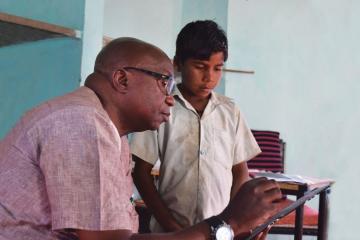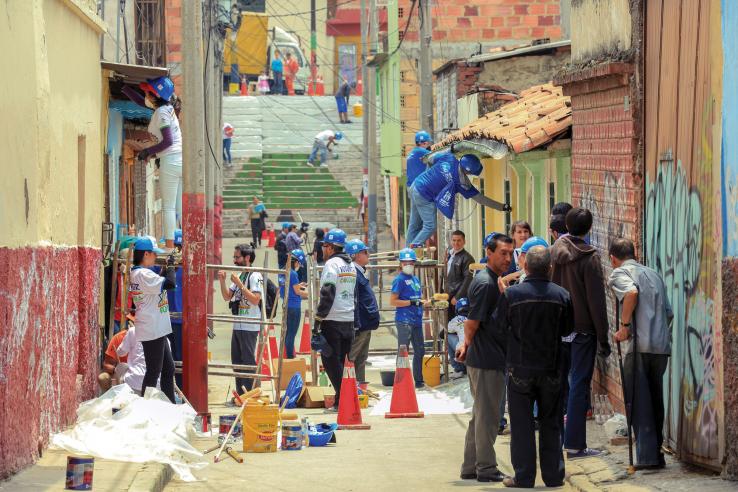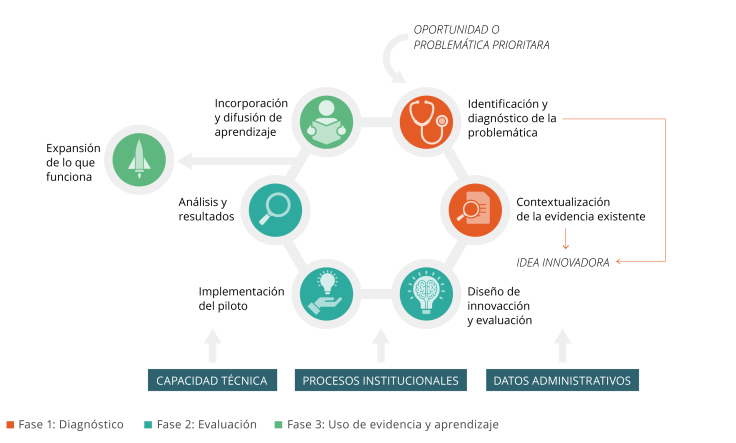
New J-PAL Report: Creating a Culture of Evidence Use in Latin America

It’s easy to talk about increasing the use of evidence in policy—but what does it take to do this in practice? What are some first steps governments can take to build a culture of using data and evidence in decision-making? What role can researchers and practitioners play in supporting these efforts?
Our new J-PAL report, “Creating a Culture of Evidence Use: Lessons from J-PAL’s Government Partnerships in Latin America,” tackles these and other pressing questions to shed light on the many paths from evidence to improved policy in government.
Since J-PAL was founded in 2003, we have built long-term partnerships with government agencies in more than fifteen countries to generate and use evidence from randomized evaluations in policy decisions. Our regional office in Latin America and the Caribbean (J-PAL LAC) has been at the forefront of these efforts, working with policymakers throughout the region to improve the effectiveness of their programs.
“Creating a Culture of Evidence Use,” funded by J-PAL’s Government Partnership Initiative, shares examples of J-PAL LAC’s government partnerships and features insights from interviews with forty officials in fifteen of our partner agencies across the region, as well as staff from organizations like Innovations for Poverty Action (IPA) and the Climate Policy Initiative (CPI) who have led some of these partnerships with us.
It details the challenges our government partners have faced in making the case for greater data and evidence use and how we have tried to help them overcome some of these challenges through our Evidence to Policy partnerships.
Figure 1: The Learning Cycle

All of J-PAL LAC’s partnerships are grounded in a conceptual model called the Learning Cycle, which has three phases: diagnosis, evaluation, and evidence use and learning. Underlying the Learning Cycle are three core competencies that enable governments to use data and evidence: technical capacity, institutional processes, and administrative data.
Building on our experiences and insights from our government partners, we provide practical tips for evidence-to-policy organizations on how to start new government partnerships and sustain them. We also highlight what we see as the most promising areas for governments to invest in to make evidence-informed policymaking more common throughout the region:
| Key Insights for Governments | Key Insights for Evidence to Policy Organizations |
| 1. It is important to allocate resources to evidence use, and to make it someone’s job to apply evidence in policy design. | 1. Proactive support from a senior government official is crucial. |
| 2. Similarly, creating dedicated spaces, like innovation labs or funds, where evidence use is encouraged and rewarded can help build a culture of evidence-informed innovation. | 2. Increasing data and evidence use is an incremental process. It is important to meet governments where they are in their data and evidence use practices. |
| 3. Greater investment in administrative data collection, management, and inter-agency data sharing can help build a foundation for long-term, systems-wide evidence use. | 3. Different types of government agencies may require different approaches depending on whether they implement, finance, and/or evaluate social programs. Be ready to adapt. |
| 4. Collaborating with evidence-to-policy organizations and researchers can provide access to reliable, customized technical support and guidance. | 4. Respond quickly to opportunities and policy windows when there is interest and authority to use evidence.1 |
| 5. Fostering broader, institution-wide support beyond key champions through on-demand data analysis or capacity building is crucial for sustainability. | |
| 6. Investing in and formalizing long-term partnerships can build greater trust and understanding, create repeated opportunities for learning, and make it easier to spot and respond to policy windows. |
Governments are some of the most important actors in reducing poverty and inequality worldwide, providing vital public services from education to health care and social assistance. For this reason, finding ways to forge partnerships that can strengthen government capacity to deliver better public services is critical for solving the world’s most pressing challenges.
The examples of government partnerships featured in “Creating a Culture of Evidence Use” just scratch the surface of a much larger movement among governments in Latin America and around the world to use data and evidence in decision-making. We hope that sharing our experiences will inspire more governments to move in this direction, and more researchers and practitioners to collaborate with governments to improve social policy.
View and download the report >>
We are always looking for new partners in these efforts. If you would like to learn more about J-PAL’s government partnerships, or if you would like to share feedback on this report, please email [email protected].
1Kingdon, J. W. 1995. Agendas, alternatives and public policies. HarperCollins College Publishers, 1995. Andrews, Matthew, Jesse McConnell, and Alison O. Wescott. 2010. "Development as Leadership-led Change-A Report for the Global Leadership Initiative and the World Bank Institute (WBI)."




